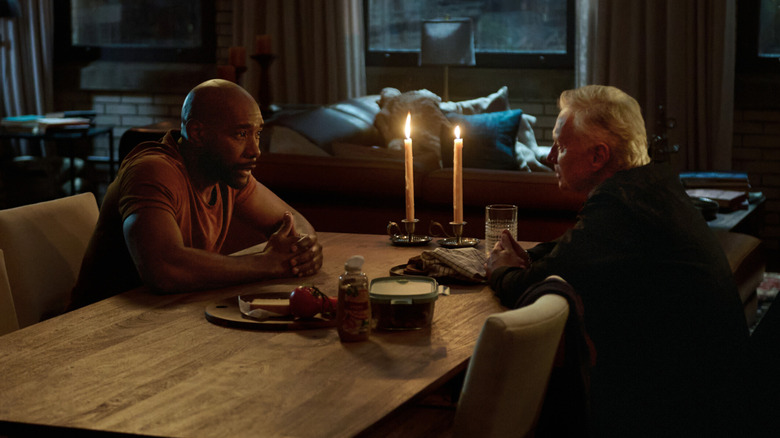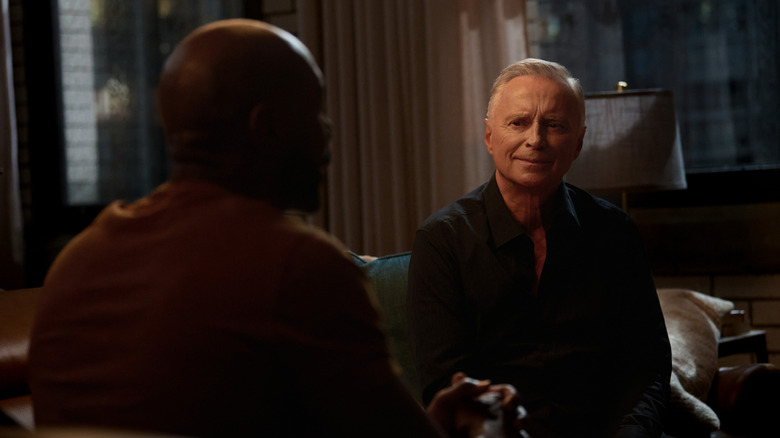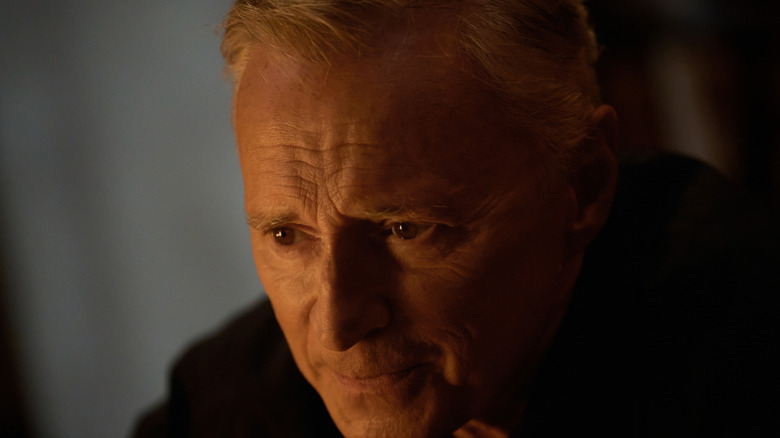Watson's Sherlock Speaks: Robert Carlyle Takes Us Inside Holmes' Mysterious Reappearance
The game is definitely afoot.
CBS' "Watson" spent a significant portion of its episode Monday on a conversation between the titular Dr. John Watson and his friend Sherlock Holmes, whom he'd thought dead until the final moments of the season premiere.
"How are you alive?" a disbelieving Watson asked as Holmes nonchalantly gathered sandwich-making supplies from the refrigerator. "Trickey. Some sleight of hand. A dash of skullduggery," his friend replied.
Holmes explained that the world thinks him dead, and he'd like to spend the rest of his life doing what he wants. "I had to clear the stage," he said. "How else can one spring a third-act surprise?"
A teary Watson hugged his friend and reveled in his ability to do so... for a while. As they talked through the night, though, John wanted real answers. He eventually got some. Holmes explained that the men Watson had seen go over Reichenbach Falls were actually his enemies James Moriarty and Jack Stapleton; he'd tricked each into thinking they were meeting him at the remote spot. But Watson's appearance interfered with the plan. "I accounted for everything, except your intrepid nature," Holmes said fondly, saying that he eventually jumped in after John did, to save him.
But Is He Really There?
Holmes' story was heartwarming, if a little shaky. We don't want to cast aspersions, but Holmes' vagueness and the fact that no one else in the episode (Laila, Shinwell, etc.) saw the famed detective — not to mention that the Season 2 synopsis said that Holmes' appearance would help Holmes unearth a secret "that lies hidden within his own body" — makes me fairly certain that Watson is seeing/hearing things, and his old partner is not actually there.
So that's where I started when I chatted with Robert Carlyle ("Once Upon a Time"), who plays the iconic sleuth in the flesh in CBS' drama. ("What We Do in the Shadows" star Matt Berry voiced the character when Watson had auditory hallucinations in a Season 1 episode.) Carlyle will around for roughly eight episodes this season; read on for his take.
TVLINE | Given the close, intimate nature of the scenes you and Morris Chestnut have in this episode, my cynical, TV-reporter brain thinks, "Oh, he's clearly a figment of his imagination."
ROBERT CARLYLE | [Laughs loudly] Oh, well, that's that then!
TVLINE | So while I do not expect you to confirm or deny that, what can you say about the fact that the two of them are so separate from everything that goes on in the rest of the episode?
No, they are. They are. That's very, very true. There's a slight geographical, or physical, reason for that, also, because there's someone else in the apartment. So that leads to that, I suppose, that they have to be a little bit quieter when they're talking. But I do agree with you. It just works extremely well, you know? Candlelight, darkness, Sherlock being back from the dead. It just all fits, doesn't it? [Laughs] I think it was the right atmosphere to play these scenes.
TVLINE | What, in your opinion, does Holmes provide for Watson that other people in Watson's life cannot?
First of all, they're long, long term friends. They've been friends for many, many, many years — long before Watson met any of these other people. So there's a kind of slight shorthand that they have with each other, which he doesn't have with the rest of the gang... Also, as the season progresses — it's only something that's come into my mind in the past few days, thinking about it, because of the scenes that we're playing at the moment in Episode 10: Sherlock is almost like a mirror to Watson. It's strange. It's almost like a kind of reflection that's coming back. Sherlock's thoughts, Watson's thoughts... You realize they're thinking as one. So I think that's what he certainly brings to Watson: He gives him a little window into himself.
'If Anyone Knows a Nemesis, It's Sherlock'
TVLINE | Sherlock Holmes has been played by many people over many years, in many different formats. What were some of the things you wanted to emulate about other performances, and what were some of the tropes you wanted to stay away from with this iconic character?
You're right. I mean, so many people played it through the years. Really, the most important thing for me was just to forget that... I think what helps, what makes it different is: He's older. And he has an older person's thoughts. This is something that she's just come up in this episode that we're shooting just now. He talks to Watson, he says, "I've been thinking about dying." Abd this, I thought, was a beautiful, beautiful line: He says, "What is true? At the exact, literal moment of my death, someone, somewhere, will kill somebody else. So I haven't really achieved anything." And I thought, wow. You know, I'm 64, and as Robert Carlyle, that's like... f–k, I really get that. In a vain kind of way, he wants his choices to outlive him.
So not that that tells you anything, but that's where I am with the whole Sherlock thing. He's more than a sleuth, and he wants to give something else to the world. Does he want to be remembered just as this guy who's really clever and solves crimes? Yeah. But it's more than that.
TVLINE | In Episode 2, Sherlock makes a point of referring to Ingrid as John's "nemesis." Will he have opinions on the other people at the clinic?
Sherlock's opinionated to the ninth [degree]. He absolutely has something to say about anyone, really, and everyone. As it progressesyou begin to realize more what he feels about Shinwell. That's for sure. That doesn't really spoil anything, I can tell you that. The other ones? ... I don't know if he really trusts any of these other people at all, but he's got his eye on Ingrid, that's for sure. Because if anyone knows a nemesis, it's Sherlock.
What are your thoughts on Sherlock's appearance in "Watson"? Let us know in the comments!


